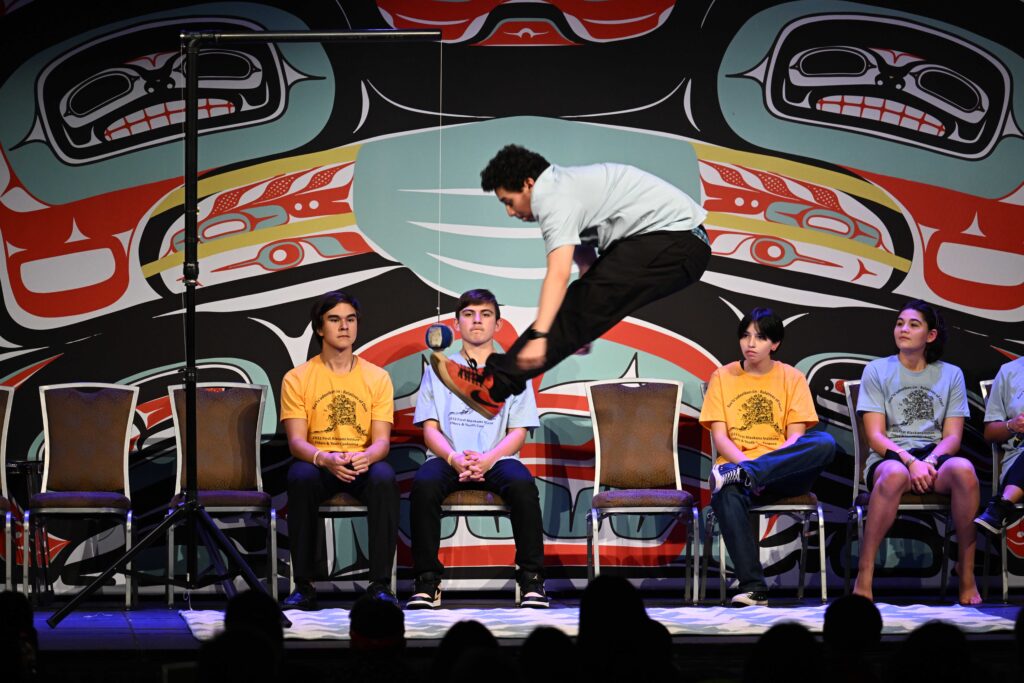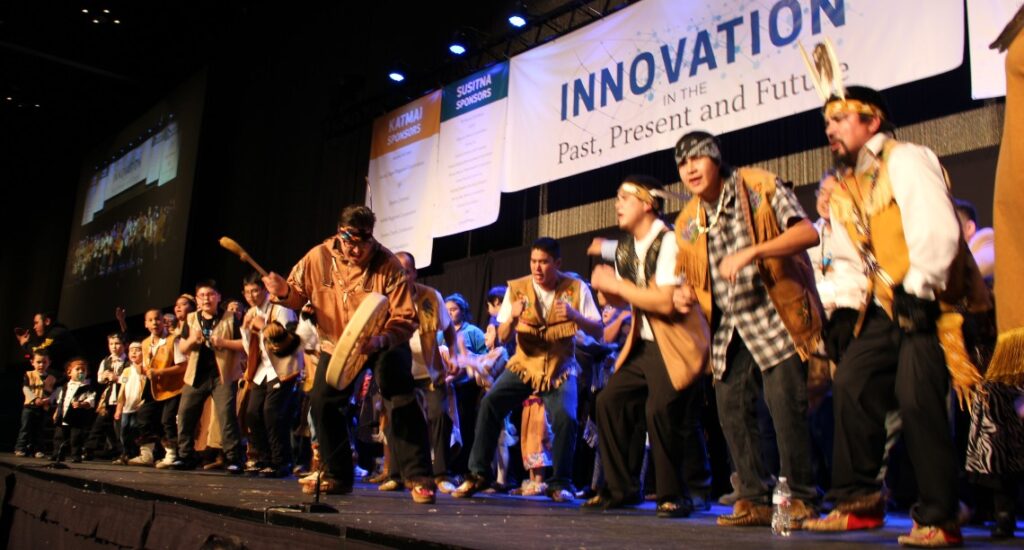
First Alaskans Institute (FAI) is a non-profit advocacy organization aimed at enhancing and expanding the lives and cultural identity of Native Alaskan people. FAI values community and cultural tradition, which is echoed in their core values: Integrity, respect, Native knowledge, and responsibility. The organization is based out of Anchorage, but has members working in Yakutat, Kake, Juneau, Dillingham, and Fairbanks as well. It hosts training seminars and dialogue sessions derived from Native Alaskan values and ways-of-knowing that are intended to address various forms of trauma, as well as social equity and systemic change. It additionally hosts an annual “Elders and youth conference” that provides an opportunity for Native learning and mentorship on the statewide scale. Furthermore, it maintains a comprehensive website and YouTube channel, as well as a presence on many other social media platforms.
Reading through its website, there are many aspects of the institute’s practices; one of those being its focus on advocacy. FAI has a holistic approach to advocacy; It utilizes dialogue sessions that promote mutual understanding, available to all Alaskans; It’s Website and YouTube channel have resources regarding civic engagement, citing the topic as one of the main ways of promoting policy change; It even showcases groups like Protecting Our Ways Of Life (POWOL) and Federation of United Pacific Peoples (FUPP) that are geared toward protecting indigenous lands and waterways. This emphasis on advocacy parallels the social work field’s values. As students, and professionals in the future, advocating for others will be a large part of how we will promote change. Learning about the world around us, and getting involved when there is a movement that resonates with us, is where the rubber will meet the road.


FAI also has an outstanding track record in regards to community engagement. The training seminars that they host are meant to increase Native cultural understanding, and not just for Native Alaskans. Their website states that the training and dialogue sessions do not have strict time restraints and that the length and content of a session is based on the needs of the group. This openness creates an excellent environment for healing, which increases the likelihood of learning. I feel that this can be transferred into battling racism. It can be hard to approach racism without an aggressive posture, at least for me, but maybe that’s why it seems to be so ineffective at times. Inviting a person that is ignorant into the circle to learn, as opposed to ostracizing them for their problematic views may yield better results. It has me thinking that it might be a good idea to create an educational anti-racism group at work.

FAI’s mission statement is: “True to identity, heritage, and values, Alaska Natives are informed and engaged in leading the decisions that shape the future.” It states that the organization is dedicated to enhancing the current generation of Indigenous leaders and cultivating the next. FAI does this through internships, mentorship, and education. Their process is intended to create better representation for Native Alaskans as decision makers and leaders. The approach grants Indigenous people more autonomy. I feel that that amplified voice also contributes to anti-racism by increasing the awareness of Native Alaskan people. There are many misconceptions about Indigenous Alaskans, many of them racist, and making the rest of the state aware of Native cultural autonomy. The word indigenous literally means originating from a particular place; we are on Native lands and there is much that we could learn from the people of these lands. Native Alaskans have had more representation in government lately, Rep. Mary Peltola for example, but I feel that more can be done. It is up to all Alaskans to help make that happen.

With all the things that FAI highlights, I think to times in my life that I have heard negative stereotypes about Native Alaskans in Fairbanks. They are spouted everywhere, at least in my experience. Remembering some of those instances, I realize that I often said or did nothing when I heard them. I even believed some of them myself, at one point. I don’t have those beliefs anymore and feel that I have turned a 180, taking a relatively anti-racist stance on the topic. So much so that it has caused some somewhat ugly disagreements at family dinners, and even ending friendships with those that were not willing to address their hateful ways. I thought about where that change took place and realized that it started in rehab. There was a veteran from Tuluksak there. They were about 35 years my elder, but we got pretty close as we were both struggling with alcoholism. We would sit and talk while we watched whatever movie was playing that night. They told me about growing up in the village and I told them about growing up in North Pole, as well as countless other topics. We were from very different generations and cultures, but we had so much in common. Learning from them made me more aware and more sensitive to Yup’ik culture and to Native Alaskan culture as a whole. Subconsciously, that lesson has rolled into the rest of my personal and professional life, and tentatively my future in social work. The willingness to accept that my preconceptions might be wrong and to learn from the people that have those lived experiences, will sharpen my ability to advocate for and educate others, as well as myself. I haven’t taken an FAI training, but if just their website and a couple YouTube videos sparked this much thought, I think I need to.
First Alaskans Institute’s website can be found at: https://www.firstalaskans.org
Landscape photo was taken from Shutterstock, all other photos and video were taken from the FAI website.
Jas Stokes
Josh, there really was so much content on their website. I’m encouraged by your recounting of the experience in rehab. For me it brings up a few thoughts. First is the importance of your own commitment to healing and lifelong education. Knowing when to ask for help is so important and something I fail at quite often. The second thought is that through your connection to that Alaska Native elder you bridged a gap crossing the barriers of difference to discover similarities and build respect for each other. I think that’s what advocacy and social work is about, helping to forge these connections and building community.
Trinity Podbicanin
Your blog was very informative and very well written! I think everything the First Alaskans Institute is doing is so great for the community! I really like that they are protecting the Alaskan Native way of life, “If we do nothing, our children will suffer the removal of our ways of life from their spirit. We cannot and will not allow this.” I think this is so important in keeping the language alive, traditions, etc. I feel the First Alaskans Institute provides many great opportunities for the Indigenous people of Alaska to gain more knowledge by providing many different resources, such as informational links to help find policymakers and community leaders, and so much more. The website provides a lot of information on ways they are trying to help Alaska’s indigenous populations. “We are committed to embodying the strength and knowledge of our peoples, values, and cultures throughout all of our work with and for our community.” I think this is important, especially since the many indigenous populations of Alaska have had to deal with modernization. Overall, your blog was very good!
Josh Fine
Thank you for the kind words. I agree with you 100%, in regards to FAI. I had seen their flyers before, but I honestly thought they just did community events. My perspective is changed completely now. I am a huge fan of their mentorship and internship program. Learning and advancing your life with the guidance of someone from your own culture seems like such an amazing tool. Personally, I know that mentorship has been a building block of my own life and I am very excited to see it being utilized elsewhere. Thank you for reading, I am glad that you were able to connect with their website. Their YouTube channel also has some pretty good podcasts, though some are very long.
Keyda Lampkin
I think your blog is well written and extremely informative. I love the visuals you provided and the information you provided regarding the Institute. I was not aware of this community resource and think it is invaluable for the Native community. Thank you for sharing this information.